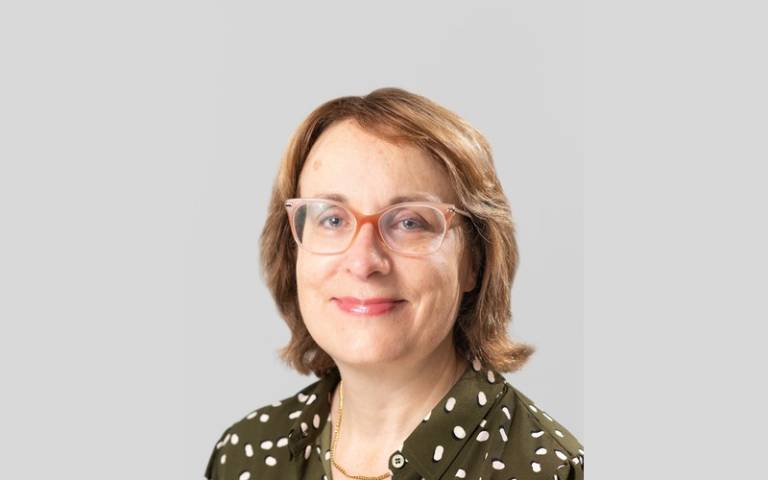Spotlight on... Anna David
7 March 2024
For UCL's Women’s Health Week, we meet Anna David, Consultant and Professor in Obstetrics and Maternal Fetal Medicine. Anna chats to us about how she combines clinical work with research into improving pregnancy and baby outcomes, and cracks an egg-cellent joke.

What is your role and what does it involve?
I am a Consultant and Professor in Obstetrics and Maternal Fetal Medicine. My job is a dual role looking after pregnant women/people as well as doing research to improve pregnancy and baby outcomes.
Clinically, I work in the Elizabeth Garrett Anderson Obstetric Wing at UCLH in the Fetal Medicine Unit doing fetal ultrasound, counselling and performing invasive prenatal diagnosis procedures such as amniocentesis. I set up the UCLH Preterm Birth clinic in 2008, where we see women who have a prior spontaneous preterm birth or baby loss.
I am also Director of the Elizabeth Garrett Anderson Institute for Women’s Health at UCL since 2018. It’s a great job as I get to meet and mentor super talented scientists and clinicians. At the Institute I lead the Prenatal Therapy research group. We are developing a portfolio of novel therapies to treat diseases of pregnancy such as fetal growth restriction, preterm birth and severe life-threatening congenital diseases in the fetus. I also really enjoy working with healthcare engineers and physicists to bring innovation to imaging in pregnancy.
How long have you been at UCL and what was your previous role?
I joined UCL in 2000 as a PhD student in fetal gene therapy and have stayed ever since. Before that, I was a Registrar in Obstetrics & Gynaecology in the North West Thames Deanery, having graduated from St Andrews University and Manchester Medical School. Those were the early days of gene therapy before any clinical trials had shown it was effective and treating genetic disease in the fetus was considered very risky. We are now beginning to see evidence that stem cell and protein therapies can be effective to treat fetal disease so it’s an exciting time to be working in this field.
What working achievement or initiative are you most proud of?
I am most proud of launching MFAET (Maternal and Fetal Adverse Event Terminology), a new system to provide better safety monitoring for clinical trials in pregnancy. This came out of a European Consortium that I was leading to develop a novel therapy for fetal growth restriction. Conducting clinical trials in pregnancy raises many challenges, primarily due to safety concerns for the mother and her fetus. This is particularly the case when testing new maternal and fetal therapies. To assess therapeutic safety in trials, we can monitor important signals about the well-being of the mother and fetus, called Adverse Events or AEs. When we checked the relevant terminologies, we discovered only a handful of adverse event descriptions were available.
The new MFAET terminology was developed two years ago through an international Delphi consensus process. It’s been enthusiastically taken up by clinical triallists, regulators and the pharma industry and will improve the conduct of clinical trials in pregnancy. It’s been great to work with patients and patient groups to drive forward this innovation and make drug development in pregnancy safer.
Tell us about a project you are working on now which is top of your to-do list
With my team, I am finishing off a series of preclinical studies on a novel drug for fetal growth restriction to test out its safety and effectiveness in helping the fetus grow before birth. We hope to take it into clinical trial in the next 2–3 years. This week we are also celebrating Women’s Health research in the lead-up to International Women’s Day. You can find out more about how we are transforming the future of women’s health, translating research discoveries into treatments, and revolutionising care for women’s health on our website.
What is your favourite album, film and novel?
My favourite album would be any by Joni Mitchell but Blue in particular. I love the lyrics and stories that she tells.
I love sci-fi films, so it would be a choice between Interstellar which is serious or The Fifth Element for more crazy fun.
My favourite novel has to be Pride and Prejudice. The film and TV versions are great but there is nothing like getting into the little digs and witticisms while reading the book.
What is your favourite joke (pre-watershed)?
Why did the egg hide? It was a little chicken.
Who would be your dream dinner guests?
I would go for an outlandish mix of famous scientists, historical figures and writers including Steve Jobs, Dorothy Hodgkin, Elizabeth 1, Henry VII, Charlotte Bronte and Oscar Wilde. Conversation would flow long into the night aided by great wine and food.
What advice would you give your younger self?
Keep going – you will make it to that dream job combining research and clinical work even though it seems a long way off.
What would it surprise people to know about you?
I like cooking Indian food. Ever since having COVID, I’ve developed a love for spicier food and have taken courses on cooking vegetarian banquets and biryani. It’s a relaxing way to wind down at the weekend.
What is your favourite place?
Surfing on a North Cornwall beach in a wetsuit, with tea and a scone with clotted cream and strawberry jam waiting for me when I dry off.
 Close
Close

